Ball Martin, M?ller Nicole. The Celtic Languages
Подождите немного. Документ загружается.

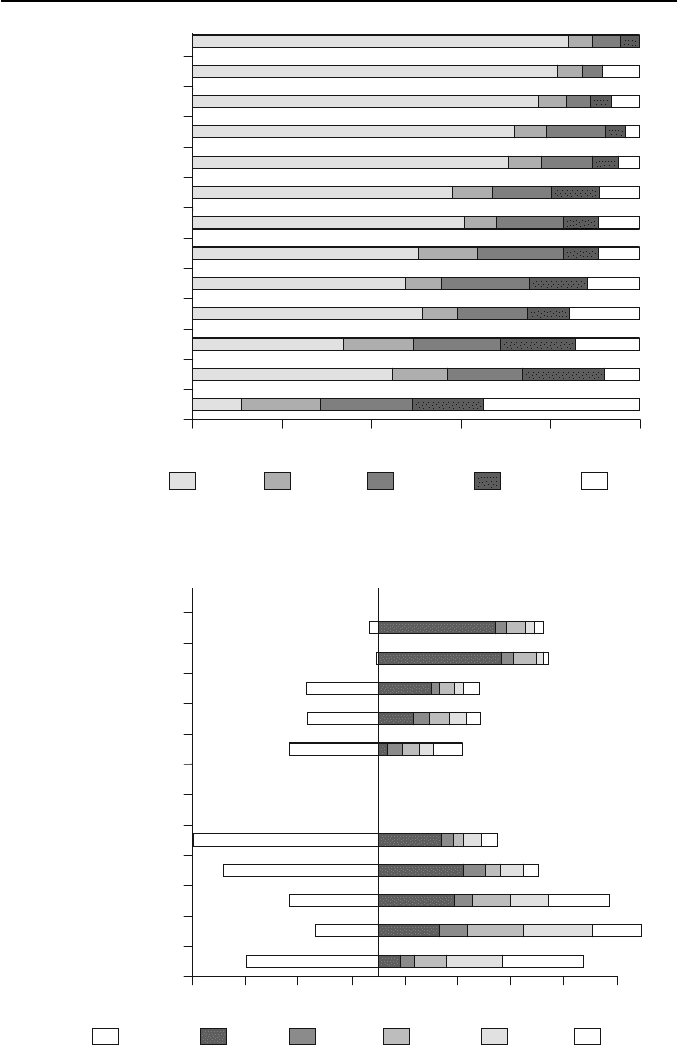
626 THE SOCIOLINGUISTICS OF THE CELTIC LANGUAGES
Only
Gaelic
Mainly
Gaelic
Both
e
q
uall
y
Mainly
En
g
lish
Only
En
g
lish
To maternal grandparents
To paternal grandparents
Between parents
To original mother
To original father
To sister
To brother
To present mother
To present father
To spouse/partner
To children
Partner to children
Between children
0% 20% 40% 60% 80% 100%
Figure 13.20b Western Isles: language use in family, 1994–5 (Euromosaic Survey
N = 130) – percentages
Not
applicable
Only
Gaelic
Mainly
Gaelic
Both
equally
Mainly
English
Only
English
1994–5 EUROMOSAIC
To original father
To original mother
To spouse/partner
To children
Between children
2004–5 WILPP survey
To original father
To original mother
To spouse/partner
To children
Between children
–140 –100 –60 –20 20 60 100 140 180
Figure 13.21a Western Isles: language use in family – Gaelic speakers, 1994–5 and
2004–5 – numerical
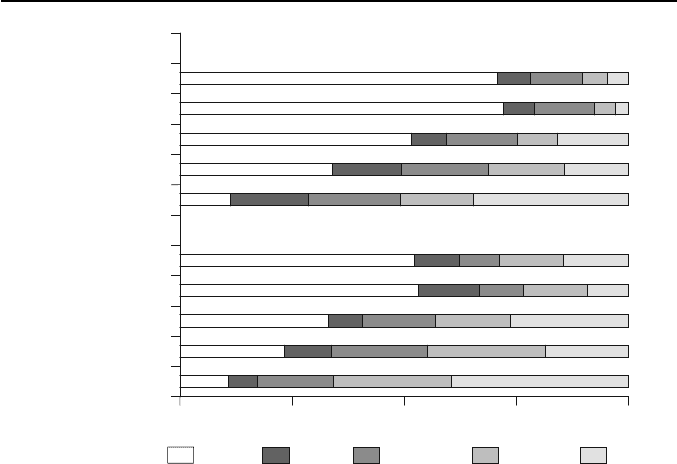
SCOTTISH GAELIC TODAY 627
Both surveys explored use of Gaelic in a range of community speech situations. The
Euromosaic survey examined language use in 30 speech situations in 1994–5. Figure
13.22a illustrates nine situations which were strongly Gaelic: retail activities, clergy,
buying a newspaper, asking the time, buying petrol, councillor, teacher, car repair and
pub. Figure 13.22b illustrates ten situations which were moderately strong for Gaelic:
hairdresser, restaurant meal, machine repair, bank, social worker, library, solicitor, sports
activities, doctor and paying the water bill. Figure 13.22c illustrates eleven situations in
which use of Gaelic was minimal: police, buying CD, tax and DSS offi ces, theatre, report-
ing gas leak or power cut, dentist, phone operator, eye test and booking a holiday.
The WILPP survey ten years later in 2004–5 examined 16 of these situations. It was
decided not to bother with the weakest situations in 1994–5. Figure 13.23a illustrates the
eight situations with the higher use of Gaelic: clergy, councillor, retail activities, buying a
newspaper, car repair, buying petrol, teacher and hairdresser. Figure 13.23b illustrates the
eight situations with lower use of Gaelic: drinking in pub, machine repair, library, sports
activities, asking the time, meal in restaurant, bank manager and doctor.
The rapid weakening of Gaelic speakers’ use of their language over this ten- year
period is very obvious. Recent initiatives to extend the range and use of Gaelic within the
Western Isles communities clearly imply a priority to encourage Gaelic speakers to use
their language to the extent they were doing so ten years previously. It also means that the
circumstances would need to be created in which this was possible, and that encourage-
ment and support would need to be effectively forthcoming for these uses to be enhanced
in the present- day community.
Always
Gaelic
Mainly
Gaelic
Both
languages
equally
Mainly
English
Always
English
1994–5 EUROMOSAIC
To original father
To original mother
To spouse/partner
To children
Between children
2004–5 WILPP survey
To original father
To original mother
To spouse/partner
To children
Between children
0% 25% 50% 75% 100%
Figure 13.21b Western Isles: language use in family – Gaelic speakers, 1994–5 and
2004–5 – percentages
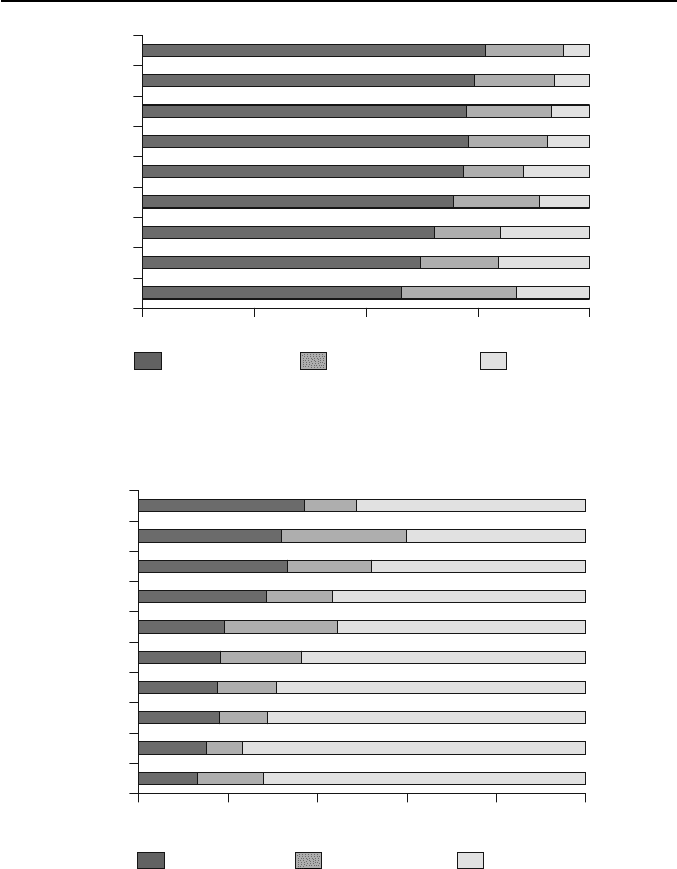
628 THE SOCIOLINGUISTICS OF THE CELTIC LANGUAGES
Gaelic can be
and is used
Shopping
Minister/priest
Buying newspaper
Asking the time
Buying petrol
Councillor
Child’s teacher
Car repair
Drinking in pub
0% 25% 50% 75% 100%
Gaelic could be
but is not used
English only can
be used
Figure 13.22a Western Isles: language use in community, 1994–5 (Euromosaic Survey
N = 130) – higher Gaelic use levels
0% 20% 40% 60% 80% 100%
Gaelic can be
and is used
Gaelic could be
but is not used
English only can be
used
Hairdresser
Ordering meal
Machine repair
Bank manager
Social worker
Library
Solicitor
Sports club
Doctor
Paying water bill
Figure 13.22b Western Isles: language use in community, 1994–5 (Euromosaic Survey
N = 130) – moderate Gaelic use levels
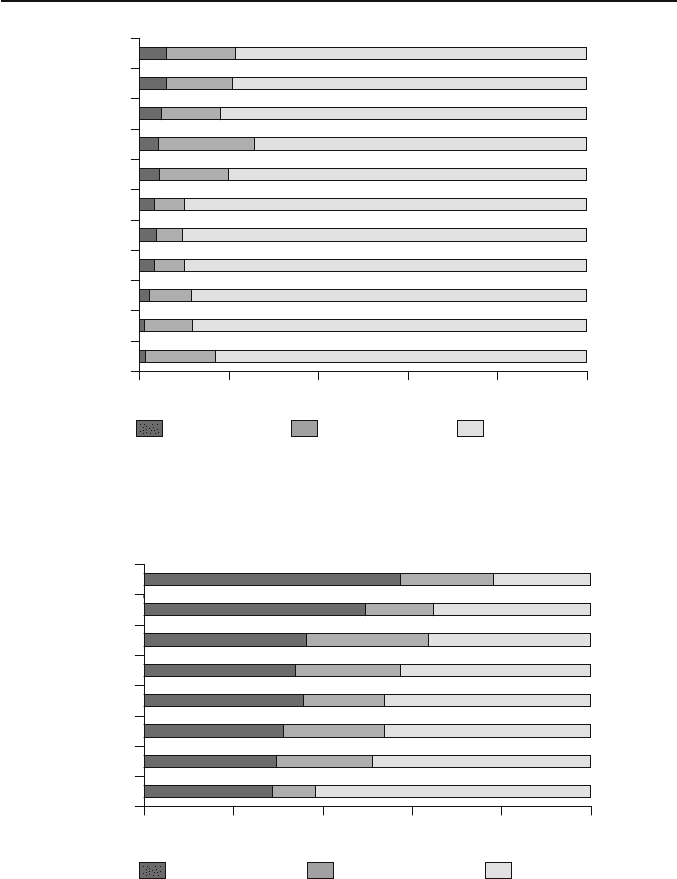
SCOTTISH GAELIC TODAY 629
0% 20% 40% 60% 80% 100%
Gaelic can be
and is used
Gaelic could be
but is not used
English only can be
used
Police
Buying CD/HiFi
Tax office
DHSS office
Theatre
Gas leak
Dentist
Phone operator
Power cut
Eye test
Booking holiday
Figure 13.22c Western Isles: language use in community, 1994–5 (Euromosaic Survey
N = 130) – minimal Gaelic use levels
0% 20% 40% 60% 80% 100%
Gaelic can be
and is used
Gaelic could be
but is not used
English only can
be used
Minister/priest
Councillor
Shopping
Buying newspaper
Car repair
Buying petrol
Child’s teacher
Hairdresser
Figure 13.23a Western Isles: language use in community, 2004–5 (WILPP survey
N = 254) – higher Gaelic use levels
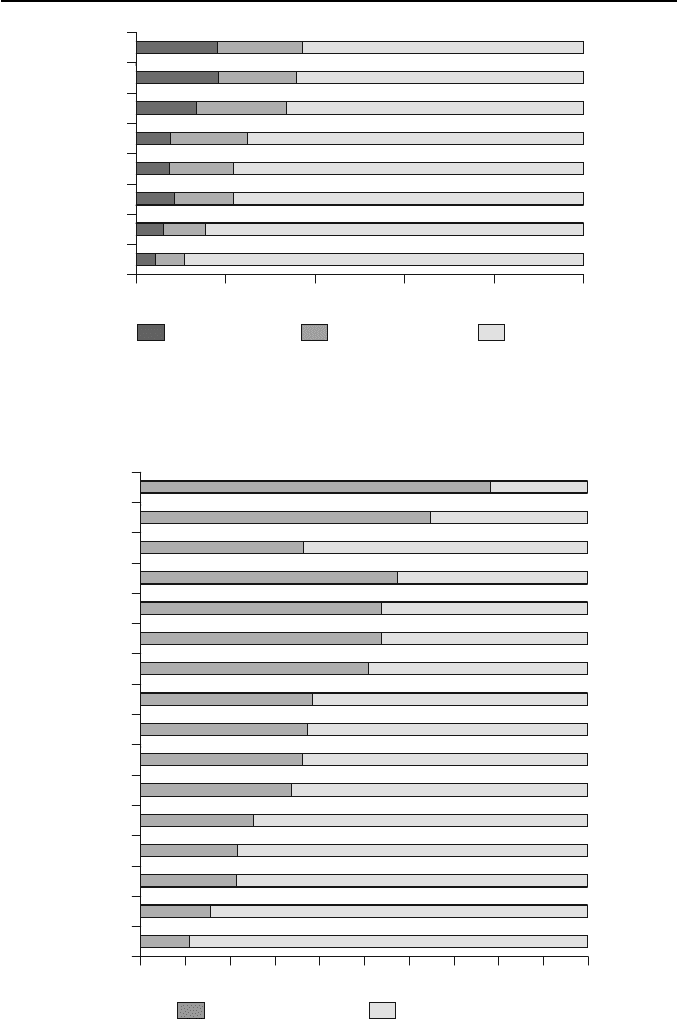
630 THE SOCIOLINGUISTICS OF THE CELTIC LANGUAGES
0% 20% 40% 60% 80% 100%
Gaelic can be
and is used
Gaelic could be
but is not used
English only can
be used
Drinking in pub
Machine repair
Library
Sports activities
Asking the time
Ordering meal
Bank manager
Doctor
Figure 13.23b Western Isles: language use in community, 2004–5 (WILPP survey
N = 254) – lower Gaelic use levels
Gaelic can be used Gaelic cannot be used
0% 10% 20% 30% 40% 50% 60% 70% 80% 90% 100%
Minister/priest
Local councillor
Shopping
Buying newspaper
Car repair
Buying petrol
Child’s teacher
Hairdresser
Drinking in pub
Machine repair
Library
Sports activities
Asking the time
Ordering meal
Bank manager
Doctor
Figure 13.24a Western Isles: Gaelic speakers in community, 2004–5 (WILPP survey
N = 254) – possible Gaelic language use in community situations
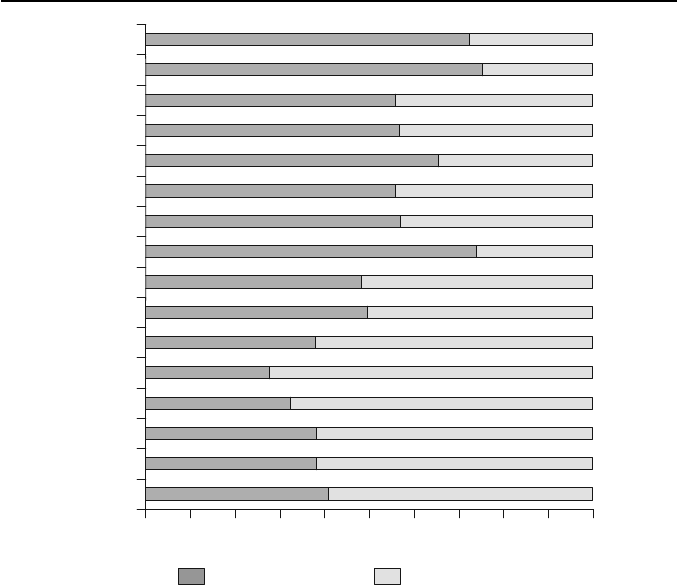
SCOTTISH GAELIC TODAY 631
Figure 13.24 (a and b) indicates the difference between possible and actual Gaelic lan-
guage use in these sixteen speech situations. There is a tendency for the situations where
Gaelic is the more possible to be stronger in actual use. But the only situations in which
use of Gaelic was reported as being used by more than 40 per cent of the respondents were
with a hairdresser, a local councillor, or with clergy. On this measure personal grooming
has overtaken the Church (– but very marginally: do not read too much into it). Another
touchstone of changing times was in asking a stranger the time. In 1994–5 this was the
fourth strongest situation for use of Gaelic. Ten years later it had become the fourth
weakest.
In many of these speech situations Gaelic cannot now be used because the signifi cant
person addressed cannot speak Gaelic. Often this is because key positions are not held by
a Gaelic speaker. As Gaelic fails to be used in the community, this is not only because a
non- Gaelic- speaking incomer holds a position in local professional and commercial life,
but because such positions are coming to be held by younger and non- Gaelic- speaking
locals. If shops and post- offi ces are local focal points where people can speak the commu-
nity language, this changes as soon as a non- Gaelic speaker takes them over. If these key
facilities for the language are to remain places where Gaelic can be and is used, then there
must be some means whereby these businesses can be acquired by Gaelic speakers from
the community.
0% 10% 20% 30% 40% 50% 60% 70% 80% 90% 100%
Minister/priest
Local councillor
Shopping
Buying newspaper
Car repair
Buying petrol
Child’s teacher
Hairdresser
Drinking in pub
Machine repair
Library
Sports activities
Asking the time
Ordering meal
Bank manager
Doctor
Gaelic is actually used Gaelic is not used
Figure 13.24b Western Isles: Gaelic speakers in community, 2004–5 (WILPP survey
N = 254) – actual Gaelic language use in community situations

632 THE SOCIOLINGUISTICS OF THE CELTIC LANGUAGES
LANGUAGE MAINTENANCE: INSTITUTIONAL SUPPORT
Provisions for Gaelic in education and public life have improved considerably since work
was done for the fi rst edition of this book to 1993. As was then noted, Gaelic provision in
education in the late nineteenth and earlier twentieth centuries was tokenistic at best. By the
late twentieth century there were bilingual administrative and educational policies in the
Western Isles, and some place for Gaelic in administration and schooling in the then Argyll
and Bute District and the Highland, Tayside and Strathclyde Regions. Some signifi cant
developments in Gaelic education have occurred since 1975, such as bilingual education
in the Western Isles and Skye. A national attitude survey on Gaelic commissioned by An
Comunn Gaidhealach in 1981 (MacKinnon 1981) paved the way for important advances
for Gaelic in the 1980s in public life and education. Building on the introduction of Gaelic
as a second language at primary level, Gaelic- medium primary units were introduced from
1985 and Gaelic nursery schools in 1988. By the late twentieth century there were bilingual
administrative and educational policies in place in the Western Isles, with Gaelic- medium
schooling making headway in Argyll and Bute, Highland, Strathclyde and Tayside Regions,
and the successor local authorities have continued these policies.
At this period, Gaelic had entered the school system in three distinct ways. In the West-
ern Isles and Skye (and in some measure, Tiree) primary education had become bilingual.
Since 1958 Inverness- shire and Ross- shire had developed the use of Gaelic as an initial
teaching medium in the early primary stage in the Gaelic areas. From 1975 the new West-
ern Isles authority developed a pilot bilingual teaching project in thirty- four of its then
fi fty- nine primary schools, which after 1981 was extended to almost every school as its
general policy. A similar scheme has been adopted by Highland Region, fi rst for northern
Skye and in the mid- 80s for the whole island, covering all twenty primary schools.
Gaelic was by 1987 also taught as a second language in seventy primary schools else-
where in Highland Region, thirty in Argyll under Strathclyde Region, and eighteen in
Highland Perthshire under Tayside. In all these cases, primary Gaelic teaching schemes,
whether bilingual or second- language, can be shown to have some stabilizing effect upon
the speech community and to enhance the local profi le of the language (see Figures 13.11
–13.16 above; and MacKinnon 1984a, 1986). Gaelic was also taught as a second language
in about 40 secondary schools in these areas, and three others in Central, Grampian and
Lothian Regions (1987 fi gures).
The third type of schooling is Gaelic- medium education. This was fi rst introduced
after parental pressure in Glasgow and Inverness: both essentially urban centres out-
with the Gaidhealtachd. Gaelic- medium units were established in two schools in 1985
(MacIllechiar, in Hulbert 1985: 28–33). Subsequently, similar units were established in
six further schools in the Western Isles and Skye. In all, thirty- seven Gaelic- medium units
had been established by 1992. The impetus for such schools came from a very successful
Gaelic playgroups movement, getting under way from about 1982, and in the following
fi ve years establishing a national organization. A total of 100 playgroups and parent- and-
toddler groups in both Gaelic- area and urban locations had been established by 1992, with
more currently projected (Scammell, in Hulbert 1985: 21–7).
By the turn of the century, demands for all- Gaelic, Gaelic- medium schools were fol-
lowing upon increasing demand for Gaelic- medium education. This has resulted in a
fourth model for Gaelic schooling. In 2006 an all- through Gaelic- medium school was ini-
tiated in Glasgow, followed in 2007 by another in Inverness. Calls for similar provision in
the Western Isles have not to date (2009) proved successful, although there is now further
discussion of three other such schools in the Highland council area.

SCOTTISH GAELIC TODAY 633
The peculiarity of Gaelic education has been that it has developed vigorously at the
primary and pre- primary stages, but been particularly poorly developed except as a
second language at the secondary stage. There were pilot schemes in the Western Isles,
and a bilingual secondary education unit opened in Glasgow in 1988. There might have
been a bilingual secondary project in the Western Isles leading on directly from bilingual
primary schooling, but the council’s nerve failed in 1979, and the scheme was remitted.
When the council resolved to continue, the government had changed and the Scottish
Education Department insisted on the delaying tactic of an independent evaluation of
the primary scheme. This eventually reported (Mitchell et al. 1987), but no correspond-
ing secondary bilingual project has followed. Meanwhile the Western Isles has internally
funded a more limited project at Lionel in Lewis, and in 1988 the six- year Lionacleit sec-
ondary opened, serving the Uists, in which Gaelic was promised a high profi le. In 1985
the government initiated a specifi c grant fund for Gaelic education – initially of £250,000
– and by 1991–2 this had grown to over £2.2 million which greatly assisted such projects.
By 2007–8) the fund stood at £5.46m.
There are yet further anomalies in Gaelic education. Although pupils can proceed
through Gaelic- medium primary education, most cannot yet undertake the secondary
stage through the medium of Gaelic. However, since 1983 they could receive a tertiary
education through the language, at Sabhal Mór Ostaig Gaelic College in Skye, which was
recognized by the Scottish Education Department and validated by the Scottish Voca-
tional Education Council, initially to undertake full- time HND courses through the
medium of Gaelic in Business, Computing and Gàidhealtachd Studies. The Gaelic Col-
lege has proceeded to develop Gaelic- medium degrees which can now be taken also at
other constituent colleges of the University of the Highlands and Islands Millennium
Institute. Since the 1880s there have been university Celtic degree courses taught through
English – at Edinburgh, Glasgow and at Aberdeen which also offers a single honours MA
in Gaelic Studies with modern emphasis.
Also in 1987, a database project was established at Sabhal Mór Ostaig, the Gaelic col-
lege in Skye. Such a development was long overdue as academic departments of Celtic
had tended to concentrate on historical rather than contemporary lexicography. The Gaelic
Department of the BBC has always played an important role in this respect – and many
Gaelic neologisms in common use today were introduced in broadcasting.
In 1987, Aberdeen and Dundee Colleges of Education merged as Northern College,
and Gaelic teacher training was to alternate in successive years with Jordanhill at Glas-
gow. This would have drastically affected the future supply of registered teachers of
Gaelic – and of other subjects through Gaelic. There have, however, been improvements
in the provision of teacher training for Gaelic and Gaelic- medium teachers, and from 2006
there have been distance- learning schemes which have eased but not yet entirely met the
shortage of specialist teachers of Gaelic and Gaelic- medium.
Since 1891 the principal Gaelic promotional organization was for many years An
Comunn Gaidhealach (‘The Highland Association’), and since 1892 it has been responsi-
ble for organizing the annual Gaelic cultural festival, the National Mòd. It has been active
in educational, publishing and cultural fi elds. With the appointment of a professional
director in 1966, it involved itself in socio- economic issues and in much more active
political pressure on both central and local government. In the mid- 1980s these roles in
public life and education, together with youth work and the media, were taken up by a
new organization, CNAG (Comunn na Gàidhlig, ‘The Gaelic Association’) funded by the
then Highlands and Islands Development Board, a governmental development agency.
This has left An Comunn Gaidhealach with a purely cultural remit. A Gaelic Arts Offi cer,

634 THE SOCIOLINGUISTICS OF THE CELTIC LANGUAGES
funded by the Scottish Arts Council, was appointed in 1987 to run the National Gaelic
Arts Project, Proiseact nan Ealan. Concurrently, the Board both assisted the newly estab-
lished Gaelic playgroups organization, Comhairle nan Sgoiltean Àraich, and helped to
establish a Gaelic learners’ organization, Comunn Luchd- Ionnsachaidh.
Since the 1980s the political parties have given increasing attention to Gaelic, with the
Scottish Labour Party and the Scottish National Party coming out with what are argua-
bly the most articulate policy statements. Offi cial statements of government policy on the
language were made by the Secretary of State in 1985 (at a CNAG conference at Sabhal
Mór Ostaig) and by a Scottish Offi ce spokesman in 1987 (at the Celtic Film Festival in
Inverness). The statement went little beyond unspecifi c general support. There were then
almost no examples of central governmental offi cial usage of Gaelic. After some direct
action campaigning the government has acceded to bilingual road- signs in Skye – and
Gaelic-
only signs in the Western Isles. In the 2000s these have been extended to main
roads on the Highland mainland.
Since 1963 a government- assisted Gaelic Books Council has considerably stimu-
lated Gaelic publishing. The fi rst all- Gaelic magazine, Gairm, has appeared regularly
since 1952 and developed a publishing business. After 200 issues it was succeeded by
Gath in 2003. Other ventures in Gaelic publishing have included a bilingual fortnightly
paper in the late 1960s; a book club in the early 1970s (both now defunct); and, most
recently, the Acair publishing house at Stornoway formed by a consortium chiefl y for
educational material, and chiefl y in Gaelic. There are Gaelic features in local newspapers
such as the Oban Times, West Highland Free Press, Inverness Courier, and Stornoway
Gazette, and the weekend supplement of The Scotsman. In recent years a monthly all-
Gaelic newspaper supplement An Gàidheal Ùr, has been published in the West Highland
Free Press.
Until it became an early victim of local government and Arts Council economies, a
Gaelic theatre company, Fir Chlis (‘The Northern Lights’) based in the Western Isles
toured annually between 1978 and 1982. The 7.84 Company has subsequently toured
with bilingual productions – but its grant was axed by the Scottish Arts Council in 1988,
and its chief executive/playwright resigned. Amateur Gaelic drama has become a vigor-
ous and popular scene over the past decade, and a new Gaelic theatre company, Ordag is
Sgealbag (‘Thumb and Forefi nger’), was formed in 1990, and subsequently, Tosg (‘Emis-
sar’), and Meanbh- chuileag (‘Midge’). A Gaelic community fi lm unit Sùil (‘Eye’) in the
1970s developed into the Celtic Film Festival with headquarters in Inverness. In 1987 a
professional Gaelic fi lm and video unit, Fradharc Ùr (‘New Vision’) was established in
Lewis and was training young Gaels in fi lm and video production. The announcement
early in 1990 of a £9.5 million annual fund for a Gaelic Television service on ITV greatly
stimulated the formation of further independent production companies. This initiative
was overseen and funded by the Gaelic Television Committee, and following infl uential
media reports this developed into the Gaelic Broadcasting Committee (1996), and then
into Gaelic Media Services (2003) and MG Alba (2008). In 2008 a dedicated digital tele-
vision channel, BBC Alba, commenced broadcasting.
Gaelic is very differently associated with the various Highland churches. Catholicism
and Episcopalianism were successively the original religions of the Gaelic people around
and after the time of the Scottish Reformation. These persuasions survive in quite well-
defi ned areas: Catholicism in South Uist and Barra in the outer islands, in Moidart and
Morar on the western mainland, and in the central Great Glen and Strathglass in Easter
Ross (these latter much reduced by the Clearances); and Episcopalianism in Lochaber
and Glencoe (where regular Gaelic services survived into the mid- twentieth century). The

SCOTTISH GAELIC TODAY 635
spread of Presbyterianism as the established Church of Scotland throughout the High-
lands has been well charted by Withers (1984, 1988) and Durkacz (1983). Initially its
efforts were associated with bringing English- language education to the Gaelic commu-
nity, the suppression of Jacobitism and acceptance of economic improvements (Campbell
1950, Durkacz 1983).
In the mid- nineteenth century the legitimation of the Highland Clearances by the
Established Church was undoubtedly a major factor in the Disruption of 1843 when the
Free Church seceded and became the major popular church in the Highlands and Islands
(Hunter 1974). In 1893, a further secession from the Free Church resulted in the forma-
tion of the Free Presbyterian Church, which is more fundamentalistically Calvinist, and
still well represented in the more remote and strongly Gaelic communities, as in Lewis
and Harris. Further splits occurred in both churches in the late twentieth century.
The Protestant churches, notably the Church of Scotland, have designated parish
charges which are ‘Gaelic essential’ and ‘Gaelic desirable’. These have tended to diminish
over the years – and with diffi culties of availability of suffi cient Gaelic- speaking ministers
for effective ‘call’ by the Gaelic congregations, there have been vacant charges and non-
Gaelic speakers fi lling ‘Gaelic desirable’ pulpits. Gaelic is now very weak in Highland
Episcopalianism but a revised Gaelic mass was authorized in 1974, and occasional Gaelic
services have been held. The Roman Catholic authorities seem to have the most effective
policy for directing Gaelic- speaking priests to Gaelic- speaking charges in the diocese of
Argyll and the Isles. A revised Gaelic liturgy was available in 1963, and there has subse-
quently been the universal introduction of the vernacular mass, and the adoption of Gaelic
as the language of worship for Gaelic congregations. In recent years the Free Presbyteri-
ans have reported acute diffi culty in attracting Gaelic speakers into the ministry, and have
interpreted this in connection with the doctrine of predestination as God’s indication of
the extinction of the Gaelic language. Nevertheless their island congregations are prob-
ably the most strongly and ethnically Gaelic of all the local churches (MacKinnon 1994:
124; 2000b: 616–17). The religious culture of all the Presbyterian churches emphasizes
the reading of scripture, home worship, and in their services the singing of the Gaelic
metrical psalms. Traditional Gaelic literacy has thus been high among all adherents. As
church- going has been near universal in the most strongly Gaelic communities, there has
been a reinforcement of religion, with Gaelic literacy and language in the most strongly
Gaelic communities of northern Skye, Lewis, Harris and North Uist.
GAELIC LANGUAGE- GROUP VIABILITY IN CENSUS PERSPECTIVE:
1961–2001
The Gaelic speech community is on the whole an ageing sector of the population –
although there have been some small increases in Gaelic- speaking abilities e.g. between
1961 and 1971 with a 10 per cent increase in the census fi gures – a feature of Lowland
Scotland exclusively. However, from 1971 to 1981 for the fi rst time there were propor-
tional and numerical increases of Gaelic speakers in the Western Isles and parts of Skye
(together with some other areas attracting oil- related industry, and suburban fringes of
the larger cities). The declining numbers of Gaelic speakers over a century of census
results have been presented in Figures 13.1 and 13.2, above. It will be seen that the over-
all decline has continued through the 1991 and 2001 censuses. The upturn of younger
Gaelic speakers in 1981 associated with primary Gaelic teaching schemes was not con-
tinued in the 1991 census, but some subsequent small increases among young people can
